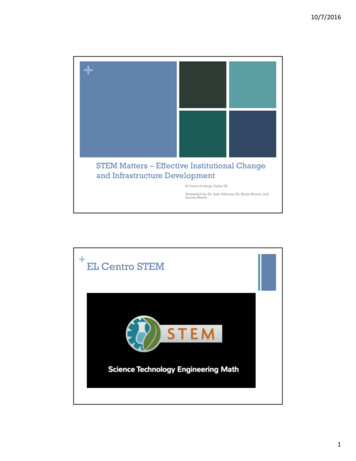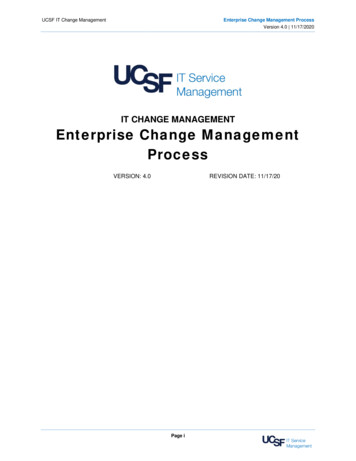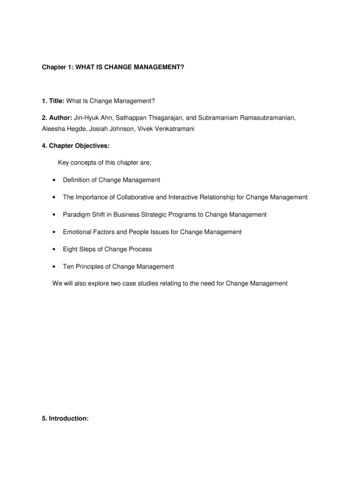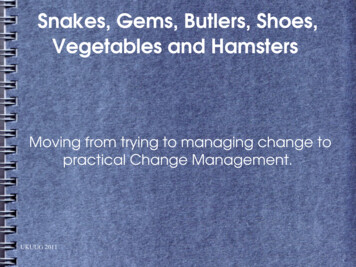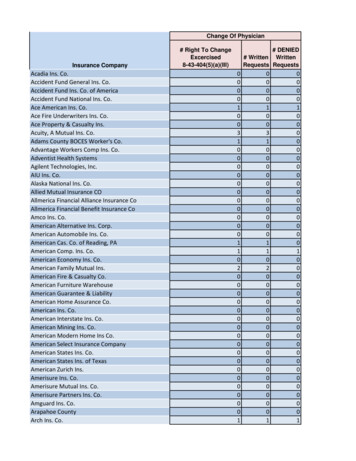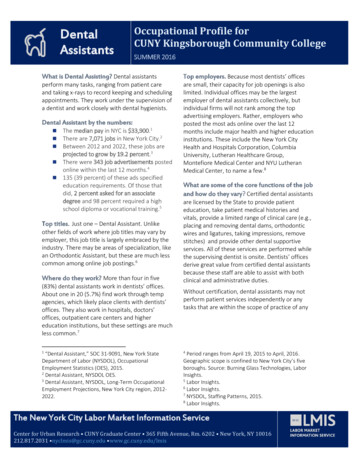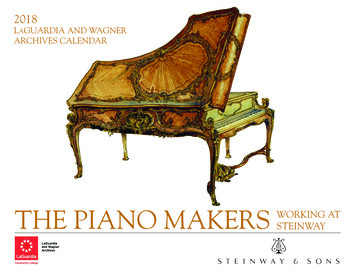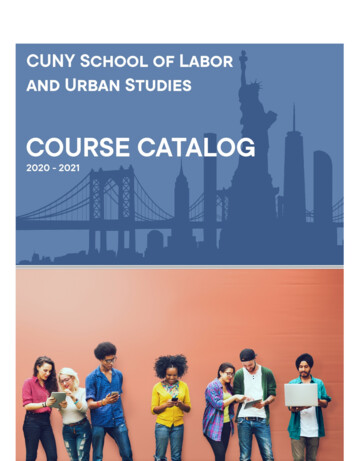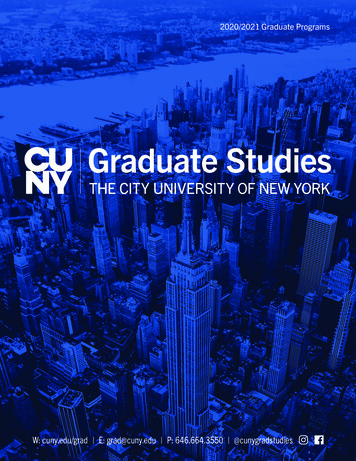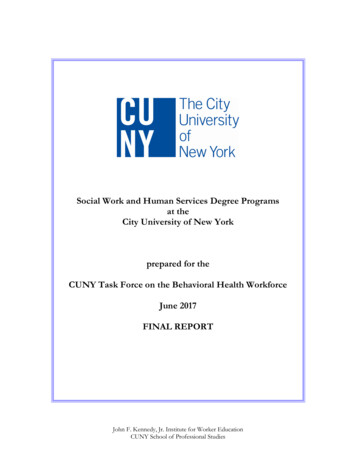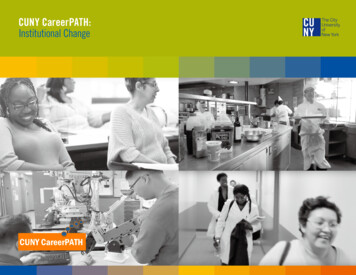
Transcription
INSTITUTIONAL CHANGECUNY CareerPATH:Institutional ChangeCUNY CareerPATHPreparation for Adults ThroughTraining and Higher Education1
CUNY CareerPATH: Institutional ChangeMicah GertzogCUNY Central Office of Academic AffairsApril 2015www.cuny.eduThis work is licensed under aCreative Commons Attribution 4.0 International License.This work is licensed under a Creative Commons Attribution 4.0 International License. This workforce solution was funded by a grant awarded bythe U.S. Department of Labor’s Employment and Training Administration. The solution was created by the grantee and does not necessarilyreflect the official position of the U.S. Department of Labor. The Department of Labor makes no guarantees, warranties, or assurances of any kind,expressed or implied, with respect to such information, including any information or it’s completeness, timeliness, usefulness, adequacy, continuedavailability or ownership. The CUNY CareerPATH Program is an equal opportunity employer/program and auxiliary aids andservices are available upon request to individuals with disabilities.
INSTITUTIONAL CHANGE2CUNY CareerPATH: Institutional ChangeIn 2011, the City University of New York (CUNY) was awarded 19.86 million through the UnitedStates Department of Labor’s Trade Adjustment Assistance Community College and Career Training(TAACCCT) grant program to offer CUNY Career Preparation for Adults Through Training & HigherEducation (CareerPATH), a four-year program aimed at adult students seeking career advancement andsuccessful college transition. The grant provided eight participating CUNY colleges with an opportunity to explore new means of supporting these students, and expand CUNY’s capacity as a key agent ofworkforce development in the New York metropolitan area.The strategies explored during the grant period were those that the USDOL held up as effective approaches, including: increased employer engagement and responsiveness to industry; new approachesto classroom instruction and student support; and the creation of career pathways which could combineboth access to jobs and access to college for program participants. As the grant period draws to a close,the experience has proven fruitful for CUNY students both in the short term – including over 2,600 program participants, the majority being unemployed – and in the long term, as the methods explored byCareerPATH are institutionalized within programs across CUNY. Our hope is that these examples canassist any CUNY program seeking to prioritize student readiness for the workforce.1. Increased employer engagement andresponsiveness to industryIndustry partnerships were a fundamental part of the CareerPATH model. Industry partnerships carrythe direct benefit of creating employment opportunities for program participants, but also gave CUNYinsight into which course curricula would appeal to employers. At Bronx Community College, CareerPATH programming created sixteen partnerships with Head Start and day care programs throughoutNew York City, and allowed for the creation of new partnerships with Montefiore Medical Center andthe YMCA of Queens. At Queensborough Community College, industry relationships created throughthe grant will allow students in the College’s biology department to pursue internships at Quest Diagnostics. The employer relationships developed both at Hostos Community College and Borough ofManhattan Community College (BMCC) will be sustained by the continuing education departments.Continuing these and developing new industry partnerships allows CUNY to continue to be a stronglink between New Yorkers and New York City’s employers.
3INSTITUTIONAL CHANGESpotlight on: New York City Labor Market Information ServiceCUNY CareerPATH was made more responsive to employer demands through the involvement ofthe New York City Labor Market Information Service (NYCLMIS), a research initiative hosted atCUNY’s Graduate Center for the purpose of giving CUNY programs a strong basis in labor marketinformation. LMIS helps to identify sectors and occupations to be targeted by training, and uses real-time labor market information to forecast areas of growth. Grant funds supported this research;allowed for the development of tools that improved training implementation; and funded the creationof career maps and overviews that helped students understand their career options.2. Access to college and credit articulation tostrengthen career pathwaysCareerPATH was developed with the understanding that short-term occupational gains would bemore meaningful for students if paired with progress toward an associated degree. This was achievedthrough credit articulation agreements created at participating colleges, whereby students completingCareerPATH trainings would also earn college credit for related CUNY degree programs. As of June2015, over 1,400 CareerPATH participants have earned college credit through the program’s no-costtraining. At BMCC, credit articulation for CareerPATH emergency medical technician (EMT) anddirect care counselor/developmental disability aide trainings (DCC) allowed students to bank credittoward BMCC’s paramedic and human services associate in applied science (AAS) degree programsrespectively. Use of this model created similar pathways for the College’s non-grant, tuition-fundedprograms in the same area. At Kingsborough Community College, the articulation agreement createdbetween the CareerPATH Community Health Worker training and the College’s AAS in communityhealth will continue beyond CareerPATH and be built into future workforce training programs.The wide variety of CareerPATH trainings resulted in many different approaches to credit articulation,but all of them were targeted toward the long-term attainment of a specific degree.Sample Credit Articulation AgreementsCOLLEGEPATH PROGRAMCREDITSDEGREEBCCEarly Childhood Education3 – 12Education A.A.SLaGuardiaCommunity Health Worker (CHW)8Community Health A.A.SKingsboroughCulinary Arts7Culinary Arts A.A.SQueensboroughMedical Office Assistant (MOA)3MOA AAS
INSTITUTIONAL CHANGE3. Student support, including advisement and jobdevelopment services4CUNY CareerPATH was created with adult students in mind, and the grant allowed the initiative todevelop support services tailored to these students. These services were chiefly embodied by studentadvisers and job developers, assisting students with occupational training completion, college access, andemployment opportunities. CareerPATH included consortium- and CUNY-wide workshops and conferencesfor these staff, allowing for sharing of best practices, models, tools, and strategies, and establishing networks to strengthen these connections at the institutional level. At LaGuardia Community College, otherworkforce development programs’ student advisers have enlarged their roles to include both programand career success. At Hostos Community College, CareerPATH advisement tools have been adaptedby the Division of Continuing Education & Workforce Development for any continuing education studentneeding support services from the College’s advisers.Industry Engagement ResourcesBased on the job development services offered through CareerPATH, CUNY’s Central Office will offera business engagement guide for program staff, including program directors, job developers, and anyoneelse who interacts with industry partners. A compendium of best practice and recommendations basedon lessons learned through the grant, the guide will be made available online for staff in CUNYprograms and nationwide.4. Curriculum, instruction, and course continuationAt Queensborough Community College, partnership between CareerPATH and the College’s Department of Biology will allow the College to offer a BI-961 Phlebotomy Practice course for the first timein years. At BMCC, trainings developed through CareerPATH have been packaged to be offered ascontinuing education classes. Experimental courses developed as part of Bronx Community College’sCareerPATH training are in the approval process to be integrated into the BCC Reading and EducationDepartment’s AAS degree in early childhood education. At the New York City College of Technology,CareerPATH curricula in additive and subtractive fabrication will be offered via the College’s GreenAdvanced Manufacturing Collaborative. The College of Staten Island School of Business degree programwill now offer the PATH entrepreneurship course. These and other examples illustrate the value broughtto the colleges by CareerPATH curricula; many of these curricula have been released with CreativeCommons licensing and are freely available.
INSTITUTIONAL CHANGE5Spotlight on: CUNY Language Immersion Program CurriculaA cornerstone of the grant program was its partnership with the CUNY Language ImmersionProgram (CLIP), CUNY’s intensive English as a Second Language (ESL) immersion program.CLIP students traditionally learn English through studying academic topics in American history,literature, and environmental studies. Grant funds allowed for the creation of new CLIP curriculawith ESL content developed around an industry and with a focus on careers and work. Over 630students enrolled in CLIP’s CareerPATH curricula. The curricula developed through CareerPATH willcontinue to be offered to CLIP students.Moving ForwardWith the formal end of the program in October 2015, the knowledge and expertise gained throughCareerPATH can enable further exploration and implementation of the program’s best practices. Areas ofpotential include: Continuing professional development and skill building for CUNY staff, including administrators, jobdevelopers, instructors, and advisers; Expanding the breadth and depth of employer partnerships in both workforce and degree programs; Implementing and supporting best practice with CUNY’s tuition-based occupational and certificate programs, or degree programs with an interest in employment outcomes; Developing CUNY’s expertise and capacity with other alternative pathways to degree completion;examples may include innovative credit articulation agreements or apprenticeship-track models; Providing technical assistance and curricula to implement seminars and workshops tailored to adults atother colleges and programs
Kingsborough Culinary Arts 7 Culinary Arts A.A.S Queensborough Medical Office Assistant (MOA) 3 MOA AAS. INSTITUTIONAL CHANGE 4 3. Student support, including advisement and job development serv
